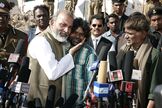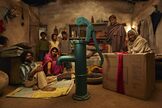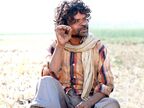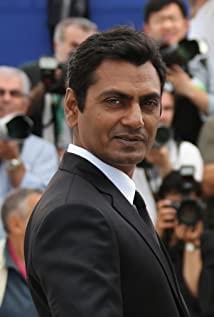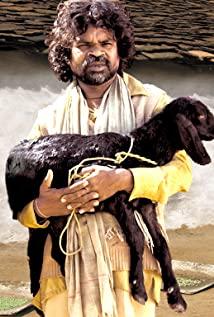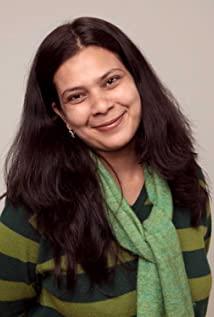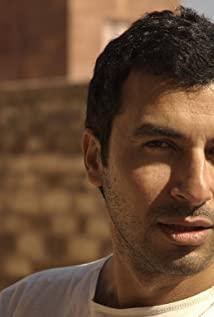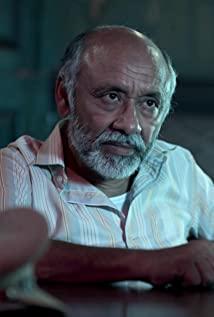In a village called Peepli in India, a pair of brothers mortgaged their land to a bank loan under tremendous pressure, but in the end they were about to be auctioned off by the bank because they were unable to repay the loan. In desperation, the brothers had to ask rich man Bhai Thakur for help, but the latter ridiculed and refused. The wealthy man also told the brothers that in South India, the government has adopted a new policy: farmers who commit suicide due to debt can get compensation of 100,000 rupees. After making a decision, the two brothers finally decided that their married brother Natha would commit suicide, and his wife could receive compensation from the government. The news did not go away, and major TV stations sent interview crews to set up cameras in the village to broadcast live day and night. As it was on the eve of the election, candidates from all walks of life were also dispatched one after another, hoping to win more support for themselves by handling this matter. A last resort suicide incident turned into a farce. Under the noise of the crowd, the younger brother became the focal point, but no one really cared about his life or death: TV stations care about ratings, and for politicians, The death or alive of the younger brother is just a bargaining chip in their political career. The result of the matter did not satisfy the onlookers: one night, after a big fire, people lifted his brother's body from the ashes. People die, but it is not the way of suicide that onlookers expected. TV reporters packed up their equipment and drove away. However, a few days later, the younger brother appeared again. It turned out that he escaped from the camera lens in the chaos of the fire, and also escaped from the countryside and came to the city.
The subtitles at the end of the film read: "India surveys in 2001 showed that 8 million Indian farmers quit farming from 1991 to 2001." The younger brother became a member of the 8 million farmers who lost their land, but the city would become his shelter. ? This is what the movie's ending left for the audience to think about, but the questioning of this final question has actually gradually emerged in the course of the twists and turns of the plot.
When the tower hesitated and tossed about having to die, his son ran over. There was such a dialogue between father and son:
-Dad, Dad, when will you die? When will you die? tell me.
——Can't you let me be quiet?
——Uncle said, after you die, I can get an appointment from the government.
——Employment?
——No, I want to be a policeman.
——I am going to die now, and you are still a policeman.
Nata drove away his son, but his son still yelled "I want to be a policeman" when he ran away. Susan Sontag once wrote: “It’s one thing to suffer pain. It’s another thing to live with painful images taken. The latter does not necessarily have the ability to strengthen conscience and strengthen sympathy. It also It may corrupt conscience and sympathy." [1] The above scene clearly adds a vivid footnote to this sentence. When one person's death becomes a way for others who were the closest to escape from suffering, the affection between father and son and brothers is cruelly abandoned. For the audience under the screen, this is a fragment of a cruel life, with the power to hit the soul; but for the people in it, it seems to have become a part of their miserable life, accustomed to it and almost numb.
What's more ironic in the film is the torture of the media's conscience. In the film, the "hosts" served by the media are the politicians and the ratings. In particular, the pursuit of ratings without a sense of social responsibility has turned a news event that could have triggered more in-depth thinking into a media carnival. When the younger brother disappeared from the media's sight in the middle of the "live broadcast", another farmer who lost his farmland had just reached the end of his life. Unable to repay the loan, the farmer’s land was auctioned off by the bank. He had to dig up wasteland and sell it every day in exchange for poor income. But one day, he was found dead in a pit he dug. According to many people, he was starved to death. The film cross-examined a young man: "Is it not important?" The hostess who once regarded the young man as an idol said to him: "The survey shows that our audience is only interested in the tower. You know this. Why? Because he was the first live-streamed suicide. Do you know how important this is?... Some people choose to become doctors, some become engineers. We are journalists, and this is what we should do." His pursuit has become a reason to ignore life, which is tantamount to a betrayal of his professional ethics by the media. When the reporters left the village at the end of the film, the young man who had longed to be one of them also abandoned his former ideals.
Although I did not say it directly, many details in the film will still trigger the audience's associations with reality:
When farmers complained: "How can we farm well? American seeds, American fertilizers, bought for a lot of money, and then prayed for rain. "The audience will immediately realize that this is the hopeless fate that Bt cotton seeds have brought to Indian farmers.
In a TV interview, when the reporter asked "What advice do you have for the government to prevent farmers from committing suicide", the Minister of Agriculture replied: "Industrialization. Developing countries cannot rely solely on agriculture." The reporter continued to ask "As the country's Minister of Agriculture, Do you think we should abandon agriculture and seek industrialization?" The Minister of Agriculture immediately retorted: "You are imposing on me, I did not say that." And this scene in the film echoes the process of industrialization of agriculture in India, and the introduction of genetically modified models is in progress. This is the most deadly step in the process of industrialization, and as shown in this film, the impact of this change on traditional family farming is huge. As the victims of this change, a large number of farmers committed suicide or abandoned them. Land, leave one's hometown to seek relief. The figures released by the Indian government show that from 1997 to 2009, 200,000 farmers committed suicide in India. As Van Dana Silva once said, "Farmer suicide is the most tragic and most striking sign of the survival crisis faced by Indian farmers" [2].
At the end of the film, the chief minister said to his assistants: "Mr. Salim recommended an American company. What is it called? Sonmanto? All the government seed contracts are given to them." At this point, the last layer of tulle was unveiled, and Monsanto's name was ready to be revealed.
The film’s criticism and reflection on the genetically modified model characterized by industrialization is multi-angled: the end of traditional family farming, the subversion of family relations in agricultural society, the infiltration of interest groups into government departments, and the influence of mass media on the role of social conscience. Betrayal, all of these have become a booster for the farmers to die.
Movies are not reality, but to a certain extent, they can be understood as a portrayal of real life or at least a projection of real social psychology. The protagonist in the movie said: "We have done so much to protect the land left by our ancestors, and now we are about to lose it. If possible, I am willing to give up my life to keep it." Standing in traditional family farming and At the bifurcation of the genetically modified model characterized by industrialization, Indian farmers are also facing a difficult choice between life and death, between holding the land and fleeing the land, just like the brother in the film.
"Who knows where we are going, the wheels are still rolling forward. There is no food, no water, find an excuse to live. Tired eyes, fuzzy dreams. There is also salt in the tears, my friend, if it falls, please taste it. "Sing like this in the film. In the history of India, salt is a symbol of freedom and independence: Mahatma Gandhi led the struggle of the Indian people against the British colonists to break the monopoly of salt. Therefore, this song seems to imply that genetically modified models are the characteristics and ways of a new round of colonial expansion, and biotechnology here plays the role of "the maid of capital in the post-industrial era" [3].
[1] [America] Susan Sontag. On Photography. Translated by Huang Xianran. Shanghai: Shanghai Translation Publishing House, 2010. 32.
[2] Shiva, Vandana. From Seeds of Suicide to Seeds of Hope: Why Are Indian Farmers Committing Suicide and How Can We Stop This Tragedy?. http://www.huffingtonpost.com/vandana-shiva/from-seeds-of-suicide-to_b_192419.html
[3] Shiva, Vandana. Biopiracy: The Plunder of Nature and Knowledge. NY: South End Press, 1997. 45.
View more about Peepli [Live] reviews


![Peepli [Live]](https://img.dogesflix.com/media/catalog/product/cache/bd935443df1c50537d4edaab4af5d446/300/360/imdb/title/cover/tt1447508/44ba40ca49a629aa71862afed172f668d33b5445.jpg)
